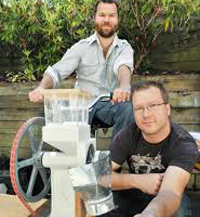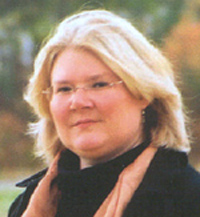Six finalists in the running for Ryga
Presented annually to a B.C. author for an outstanding book about social issues, the George Ryga Award for Social Awareness is a $2500 literary prize to be presented at the Vancouver Public Library on June 29.
February 21st, 2016

Carrie Saxifrage is one of six authors shortlisted for this year's Ryga Award.
This year’s shortlisted nominees have been announced.
In alphabetical order:
David Boyd for The Optimistic Environmentalist: Progressing Toward a Greener Future (ECW $19.95)
Larry Gambone for No Regrets (Edmonton: Black Cat Books $18)
Chris and Josh Hergesheimer for The Flour Peddler (Caitlin $24.95)
Andrew MacLeod for A Better Place on Earth: The Search for Fairness in Super Unequal British Columbia (Harbour $22.95)
Also see: http://bcbooklook.com/2015/04/28/bring-back-the-tar-n-feathers/
Carrie Saxifrage for The Big Swim: Coming Ashore in a World Adrift (New Society $16.95)
David Suzuki for Letters to My Grandchildren (Greystone $27.95)
***
The judges for this year’s competition were:
Librarian Jane Curry (Branch Head, Kerrisdale Branch, Vancouver Public Library), author Trevor Carolan (a professor of English and Asian Religion at University College of the Fraser Valley), author George Johnson (a Professor of English at Thompson and a long-time Chair of the Global and Community Action Committeee at Kamloops United Church).
The Ryga Award will be presented in conjunction with the George Woodcock Lifetime Achievement Award.
Supported by Yosef Wosk and Vancouver Public Library, the Ryga Award is administered by Pacific BookWorld News Society. The award is an annual literary prize initiated by Alan Twigg of BC BookWorld and John Lent of Okanagan College in association with The George Ryga Society. In 2003, Vancouver writer Maggie de Vries won the first Ryga Award for her memoir Missing Sarah (Penguin Canada) about her sister who went missing on the Downtown Eastside. In 2004, The Greenpeace to Amchitka: An Environmental Odyssey (Arsenal Pulp Press) by the late Robert Hunter was selected and the award was presented to Robert Hunter’s widow during a Greenpeace crew reunion. In 2005, the winning book was In Plain Sight: Reflections On Life In Downtown Eastside Vancouver (Talonbooks), edited by Leslie Robertson and Dara Culhane.
Information about all other subsequent winning titles is available here:
George Ryga: An Appreciation
George Ryga is British Columbia’s greatest playwright. Only Eric Nicol, who had the first production of an original play by a B.C. writer at the Vancouver Playhouse, could begin to lay equal claim to the title of Father of B.C. Playwriting in the modern era.
“More than any other writer,” said theatre director John Juliani, “George Ryga was responsible for first bringing the contemporary age to the Canadian stage.”
Ryga was, as playwright Charles Tidler once put it, “Canadian theatre’s eloquent plea for the defence.”
The turning point for Ryga–and for Canadian drama–was his lyric documentary play about a young First Nations woman named Rita Joe who comes to the city only to die on Skid Row. Commissioned as a work for Canada’s Centennial celebrations, The Ecstasy of Rita Joe is easily one of the most moving plays that Canada has ever produced.
With its circular structure and Brechtian use of a singer outside of the action, The Ecstasy of Rita Joe, for Ryga, was more than a reflection of a local case of racial prejudice. It was his attempt to express his universal disdain and intolerance for injustice. “This issue is the burning issue of our time,” he said. “It is what the Congo, Bolivia, Vietnam are about. People who are forgotten are not forgetting. To overlook them is a dangerous delusion.”
The play first starred Frances Hyland as Rita Joe; Chief Dan George as her father; Ann Mortifee as the singer; Robert Clothier as the priest; and August Schellenberg as Jaimie Paul. It was directed by George Bloomfield. It premiered on November 23, 1967 at the Vancouver Playhouse. Ultimately the integrity of its central character demands self-destruction, a reflection perhaps of Ryga’s early Catholic upbringing that he rejected in favour of socialist politics. In a perverted way, notes critic R.B. Parker, “her [Rita Joe’s] rape and death are the ecstasy of a martyr.”
The Ecstasy of Rita Joe was also the first play in English to be presented in the National Arts Centre Theatre in Ottawa in 1969. For several years afterwards it shook the nation. Less acclaimed nowadays, its follow-up at the Vancouver Playhouse, Grass & Wild Strawberries, was a greater commercial success in B.C. with original music from The Collectors (who later became Chilliwack). In keeping with the communalism of the Ryga household in Summerland, where artists were continuously welcome, Grass & Wild Strawberries was a genuine ‘happening’ that boldly embraced the zeitgeist of Vancouver’s volatile street scene and B.C.’s back-to-the-land hippie movement.
Spurred by these two remarkable hits, the Vancouver Playhouse then commissioned Ryga for another play slated for presentation in February of 1971. Ryga’s political drama Captives of a Faceless Drummer closely paralleled the events of the October Crisis in 1970, dramatizing conflicting ideologies. The Playhouse board of directors reversed a decision to produce the play. This led to the outright dismissal of artistic director David Gardner and to the reputation of Ryga as being ‘too radical’. Neil Simon’s Plaza Suite was produced instead.
The repercussions for Ryga were devastating. “The potentially greatest playwright in this country was blacklisted,” theatre director and impresario Richard Ouzounian has claimed, “as carefully and as thoroughly as any one of the ‘Hollywood Ten’ were under McCarthy.”
Ryga was born in Deep Creek, Alberta in 1931. He was raised by poor immigrant Ukrainian parents as a Catholic on a farm in northern Alberta.
After seven years in a one-room country school, he left to work at a variety of occupations. In 1949, his writings for various competitions earned him a scholarship to Banff. He studied with Dr. E.P. Conklin of the University of Texas, Jerome Lawrence and Burton James. His first play broadcast on television, Indian (1961), was based on his experiences working with Cree Indians on his father’s farm during a period when Ryga was recovering from a bout of pneumonia. He understood how the Crees could view white man’s society as a prison. “Indian emerged out of the soil and wind of a situation in which I was painfully involved,” he later wrote.
George Ryga credited the intervention of Daryl Duke for the successful launching of Indian and, with it, his professional career. Plays for television that followed included The Storm (1962), Bitter Grass (1963), For Want of Something Better To Do (1963), The Tulip Garden (1963), Two Soldiers (1963), The Pear Tree (1963) and Man Alive (1965). At the same time he was writing 12 short stories for radio and stage plays that included A Touch of Cruelty (1961), Half-Caste (1962), Masks & Shadows (1963), Bread Route (1963), Departures (1963), Ballad for Bill (1963), Indian (1964) and an adaptation of Margaret Laurence’s The Stone Angel (1965).
This frenzied burst of activity included drafts for at least six unpublished novels, The Bridge (1960), Night Desk (1960–later published in 1976), Wagoner Lad (1961), Poor People (1962), Sawdust Temples (1963) and Old Sam (1963). The volume of work attests to the passion within the man. Ryga was proud to think of himself as a commercial writer. In 1977, for example, he wrote a script for the American TV show The Bionic Woman entitled Garden of the Ice Palace–and it was bought and produced after several rewrites. But money was always scarce. George Ryga persevered from the Okanagan with scores of radio and television plays, plus a series of hard-edged and increasingly political novels published by Talonbooks.
The published version of Rita Joe had helped Talonbooks grow into the country’s leading publishing house for drama, but Ryga never prospered.
“We were always broke and we couldn’t afford paper,” his wife Norma Campbell once said. “So George did most of his writing in his head and only produced two drafts, a first and a final.” Ryga was also an avid songwriter and banjo player; his son Campbell Ryga has since become a highly respected saxophonist.
George Ryga died of cancer on November 18, 1987 at age 55. For several years afterwards his wife Norma remained in their home, just off Happy Valley Drive, overlooking Lake Okanagan, beneath Giant’s Head, where George Ryga sometimes went hiking. The house has since become the George Ryga Centre, mostly overseen by Ryga’s longtime friend and sometimes director Ken Smedley.
In 1993, when the B.C. Book Prizes ceremonies were held for the first time away from the coast, in Penticton, on April 24, a George Ryga Memorial Gathering was held to celebrate his spirit at Okanagan College.
Coincidentally Talonbooks released a final volume of Ryga’s posthumous writing, Summerland ($19.95), edited by Ann Kujundzic. This final book is a collection of essays and excerpts that reflects Ryga’s deeply political nature and his abiding sympathy for the downtrodden.
James Hoffman produced a comprehensive biography in 1995.
BOOKS:
Song of My Hands & Other Poems (privately published, 1956)
The Ecstasy of Rita Joe (Talonbooks 1970)
The Ecstasy of Rita Joe and Other Plays (General Publishing 1971) Includes Indian; Grass and Wild Strawberries.
Sunrise on Sarah (Talonbooks, 1973)
Hungry Hills (Talonbooks 1974). Originally published by Longman’s Canada in 1963.
Night Desk (Talonbooks 1976)
Ballad of a Stonepicker (Talonbooks 1976). Originally published as Ballad of a Stone-Picker (London: Michael Joseph Limited 1966).
Ploughman of the Glacier (Talonbooks 1977)
Seven Hours to Sundown (Talonbooks 1977)
Beyond the Crimson Morning (Doubleday, 1979)
Two Plays: Paracelsus and Prometheus Bound (Turnstone, 1982)
A Portrait of Angelica & A Letter to My Son (Turnstone, 1984)
In the Shadow of the Vulture (Talonbooks 1985)
The Athabasca Ryga (Talonbooks 1990)
Summerland (Talonbooks 1992)
George Ryga: The Other Plays (Edited by James Hoffman) (Talonbooks, 2004)
George Ryga: The Prairie Novels (Edited by James Hoffman) (Talonbooks, 2004)
SELECTED PRODUCTIONS:
The Ecstasy of Rita Joe (1967)
Grass and Wild Strawberries (1969). With music by The Collectors.
Captives of a Faceless Drummer (1971)
Sunrise on Sarah (1972)
Portrait of Angelica (1973)
Paracelsus (1986)
ABOUT RYGA:
The Canadian Dramatist, Vol. 1, Politics and the Playwright: George Ryga, by Christopher Innes (Simon & Pierre, 1985)
The George Ryga Papers (University of Calgary, 1995)
The Ecstasy of Resistance: A Biography of George Ryga, by James Hoffman (ECW Press, 1995)









Leave a Reply